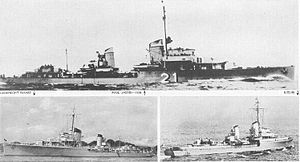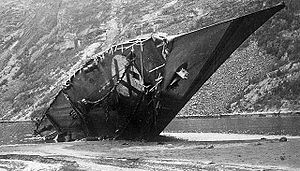Type 1934-class destroyer

Zerstörer 1934
|
|
| Class overview | |
|---|---|
| Builders: | Deutsche Werke, Kiel |
| Built: | 1934–1935 |
| In commission: | 1937–1947 |
| Completed: | 4 |
| Lost: | 3 |
| General characteristics | |
| Class and type: | Zerstörer 1934 |
| Displacement: | 3,155 long tons (3,206 t) maximum |
| Length: | |
| Beam: | 11.30 m (37 ft 1 in) |
| Draught: | 4.23 m (13 ft 11 in) |
| Propulsion: |
|
| Speed: | 36 knots (67 km/h; 41 mph) |
| Range: | 1,900 nmi (3,500 km; 2,200 mi) at 19 kn (35 km/h; 22 mph) |
| Complement: | 325 |
| Armament: |
|

The scuttled wreck of the Bernd von Arnim in the Rombaksfjord near Narvik.
|
|
| Class overview | |
|---|---|
| Builders: |
|
| Built: | 1935–1936 |
| In commission: | 1937–1958 |
| Completed: | 12 |
| Lost: | 7 |
| General characteristics | |
| Class and type: | Type 1934A-class destroyer |
| Displacement: | 2,223 metric tons (2,188 long tons) |
| Length: | |
| Beam: | 11.30 m (37 ft 1 in) |
| Draft: | 4.23 m (13 ft 11 in) |
| Installed power: | 70,000 PS (51,000 kW; 69,000 shp) |
| Propulsion: |
|
| Speed: | 36 knots (67 km/h; 41 mph) |
| Range: | 2,040 nmi (3,780 km; 2,350 mi) at 19 knots (35 km/h; 22 mph) |
| Complement: | 325 |
| Armament: |
|
| Class overview | |
|---|---|
| Builders: | DeSchiMAG |
| Operators: | |
| Preceded by: | Type 1934A class |
| Succeeded by: | Type 1936A class |
| Built: | 1936–1939 |
| In service: | 1938—1956 |
| In commission: | 1938–1949 |
| Planned: | 26 |
| Completed: | 6 |
| Lost: | 5 |
| Scrapped: | 1 |
| General characteristics | |
| Class and type: | Type 1936-class destroyer |
| Displacement: | 2,806 tonnes (2,762 long tons) (standard) |
| Length: | 123.40–125.10 meters (404 ft 10 in–410 ft 5 in) o/a |
| Beam: | 11.75 m (38 ft 7 in) |
| Draft: | 4.50 m (14 ft 9 in) |
| Installed power: | 70,000 PS (51,000 kW; 69,000 shp) |
| Propulsion: |
|
| Speed: | 36 knots (67 km/h; 41 mph) |
| Range: | 2,090 nmi (3,870 km; 2,410 mi) at 19 knots (35 km/h; 22 mph) |
| Complement: | 323 |
| Armament: |
|
 |
|
| Class overview | |
|---|---|
| Builders: | DeSchiMAG |
| Built: | 1938–1941 |
| In commission: | 1940–1958 |
| Completed: | 8 |
| Lost: | 4 |
| General characteristics | |
| Class and type: | Zerstörer 1936A (Narvik-class) |
| Displacement: | 3,605 long tons (3,663 t) maximum |
| Length: | |
| Beam: | 12 m (39 ft 4 in) |
| Draught: | 4.65 m (15 ft 3 in) |
| Propulsion: |
|
| Speed: | 37.5 knots (69.5 km/h; 43.2 mph) |
| Range: | 2,180 nmi (4,040 km; 2,510 mi) at 19 knots (35 km/h; 22 mph) |
| Complement: | 330 |
| Armament: |
|

Z39 under US flag as DD-939 in 1945
|
|
| Class overview | |
|---|---|
| Builders: | |
| Built: | 1940–1943 |
| In commission: | 1942–1964 |
| Completed: | 7 |
| Lost: | 1 |
| General characteristics | |
| Class and type: | Zerstörer 1936A (Mob) |
| Displacement: | 3,700 long tons (3,800 t) maximum |
| Length: | |
| Beam: | 12 m (39 ft 4 in) |
| Draught: | 4.62 m (15 ft 2 in) |
| Propulsion: |
|
| Speed: | 37.5 knots (69.5 km/h; 43.2 mph) |
| Range: | 2,240 nmi (4,150 km; 2,580 mi) at 19 knots (35 km/h; 22 mph) |
| Complement: | 330 |
| Armament: |
|
| Class overview | |
|---|---|
| Builders: | DeSchiMAG |
| Built: | 1941–1945 |
| In commission: | 1943–1964 |
| Planned: | 8 |
| Completed: | 3 |
| Cancelled: | 3 |
| Lost: | 3 |
| General characteristics | |
| Class and type: | Zerstörer 1936B |
| Displacement: | 3,540 long tons (3,600 t) maximum |
| Length: | |
| Beam: | 12 m (39 ft 4 in) |
| Draught: | 4.21 m (13 ft 10 in) |
| Propulsion: |
|
| Speed: | 36.5 knots (67.6 km/h; 42.0 mph) |
| Range: | 2,600 nmi (4,800 km; 3,000 mi) at 19 knots (35 km/h; 22 mph) |
| Complement: | 330 |
| Armament: |
|
| Class overview | |
|---|---|
| Builders: | Deschimag, Bremen |
| Planned: | 1 |
| Completed: | 0 |
| Lost: | 1 |
| General characteristics | |
| Class and type: | Zerstörer 1942 |
| Displacement: | 2,330 long tons (2,370 t) standard |
| Length: | |
| Beam: | 11 m (36 ft 1 in) |
| Draught: | 4.37 m (14 ft 4 in) |
| Propulsion: |
|
| Speed: | 36 knots (67 km/h; 41 mph) |
| Range: | 5,500 nmi (10,200 km; 6,300 mi) at 19 knots (35 km/h; 22 mph) |
| Complement: | 235 |
| Armament: |
|
| Class overview | |
|---|---|
| Name: | Flottentorpedoboot 1939 (Elbing-class) |
| Builders: | Schichau |
| In commission: | 1941–1944 |
| Completed: | 15 |
| Lost: | 11 |
| General characteristics | |
| Displacement: | 1,755 long tons (1,783 t) maximum |
| Length: | |
| Beam: | 10 m (32 ft 10 in) |
| Draught: | 3.22 m (10 ft 7 in) |
| Propulsion: |
|
| Speed: | 32.5 knots (60.2 km/h; 37.4 mph) |
| Range: | 2,400 nmi (4,400 km; 2,800 mi) at 19 knots (35 km/h; 22 mph) |
| Complement: | 205 |
| Armament: |
|
At the outbreak of the Second World War Nazi Germany's Kriegsmarine had 21 destroyers (Ger: Zerstörer) in service, while another one was just being completed. These 22 vessels - comprising 3 classes (Type 34, 34A and 36) - had all been built in the 1930s, making them modern vessels (no destroyers remained in German hands following the close of the First World War). Including that final pre-war vessel, a further 19 were brought into service during the war and more were captured from opposing navies, including the Italian Navy (Regia Marina) after the Italian Armistice with the Allies in 1943.
German destroyer classes were generally known by the year of their design. Because of their size, use and weaponry, some vessels classified as "fleet torpedo boats", Flottentorpedoboot, are also described. During World War II, destroyers were administratively grouped into one of several destroyer flotillas.
Class general characteristics are taken from the first of each class, and may differ slightly for individual ships, particularly when they were refitted. Post-war, some surviving ships had significant changes to armament.
This class of four ships was the first German destroyer class. It was designed around a new type of engine, using high pressure steam. This should have allowed higher speed, while saving space and crewmembers. The engine was however so complicated and prone to breakdown, that it forced the navy to assign even more very highly qualified personnel on board to operate and service them. As a result of stability problems, the range of the ships had to be restricted by navy regulations, allowing them to use only half of the fuel carried, to prevent the ships from becoming too light. The bow proved to be a faulty design, resulting in the ship to get too wet in heavy seas. This was fixed by rebuilding all four ship of the class before 1939. Four destroyers were laid down between October 1934 and January 1935. Only one ship survived the war. The ships were named after German navy personnel killed in World War I.
The ships were:
...
Wikipedia
